The global 3D laser scanner market is projected to reach USD 1,988.4 million in 2025 and is expected to grow to USD 4,214.0 million by 2035, reflecting a CAGR of 6.6% during the forecast period. Growth is supported by the increasing demand for accurate, real-time data acquisition across sectors such as aerospace, automotive, healthcare, and industrial manufacturing.
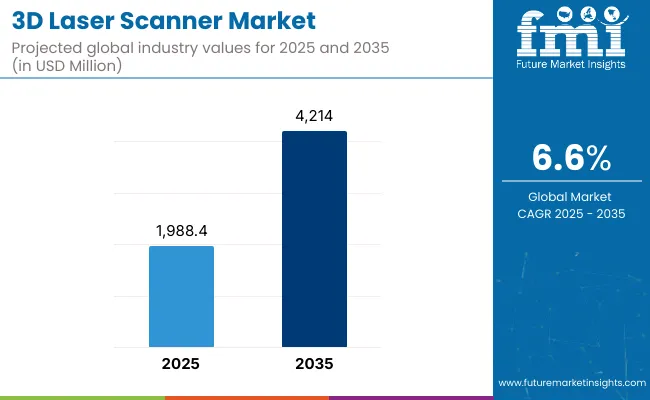
| Attributes | Key Insights |
|---|---|
| Estimated Market Value, 2025 | USD 1,988.4 million |
| Projected Market Value, 2035 | USD 4,214.0 million |
| Market Value CAGR (2025 to 2035) | 6.6% |
These devices offer non-contact measurement capabilities that enable precise geometry capture and digital modeling of physical objects. 3D laser scanning technology uses laser light or structured beams to capture the dimensions of objects, generating point clouds that can be processed into high-fidelity 3D models.
The adoption of this technology helps reduce labor costs and material waste while improving productivity and quality assurance. These advantages have accelerated its application in reverse engineering, product design, quality inspection, and construction management.
Key growth drivers include the increasing integration of 3D scanning in industrial automation, infrastructure development, and healthcare applications such as prosthetics design and surgical planning. The automotive industry continues to adopt 3D scanning for component validation and prototyping, while aerospace manufacturers use it for maintenance, repair, and overhaul (MRO) processes. In healthcare, scanning systems are being deployed to create customized implants and assist in diagnostic imaging workflows.
Technological advancements have led to the development of portable and tripod-mounted scanners, improving mobility and reducing dependency on fixed installations. Tripod-mounted scanners are expected to dominate due to their suitability for high-precision tasks in construction and large-scale industrial applications. Integration with cloud-based platforms and software for data analytics and visualization further enhances the utility of these systems, supporting digital twin creation and real-time project monitoring.
North America and Europe are expected to remain key markets, driven by strong industrial bases, early technology adoption, and supportive infrastructure for advanced manufacturing. Asia-Pacific is emerging as a high-growth region, supported by rapid industrialization, automotive production, and smart manufacturing initiatives.
The table below presents a comparative assessment of the variation in CAGR over six months for the base year (2024) and current year (2025) for the global 3D Laser Scanner market. This analysis reveals crucial shifts in market performance and indicates revenue realization patterns, thus providing stakeholders with a better vision of the market growth trajectory over the year. The first half of the year, or H1, spans from January to June. The second half, H2, includes the months from July to December.
The below table presents the expected CAGR for the global 3D Laser Scanner sales over several semi-annual periods spanning from 2024 to 2034. In the first half (H1) from 2024 to 2034, the business is predicted to surge at a CAGR of 6.1%, followed by a slightly higher growth rate of 6.8% in the second half (H2).
| Particular | Value CAGR |
|---|---|
| H1 (2024 to 2034) | 6.1% |
| H2 (2024 to 2034) | 6.8% |
| H1 (2025 to 2035) | 6.3% |
| H2 (2025 to 2035) | 6.9% |
Moving into the subsequent period, from H1 2025 to H2 2035, the CAGR is projected to increase slightly to 6.3% in the first half and remain relatively moderate at 6.8% in the second half. In the first half (H1) the market witnessed an increase of 20 BPS while in the second half (H2), the market witnessed an increase of 10 BPS.
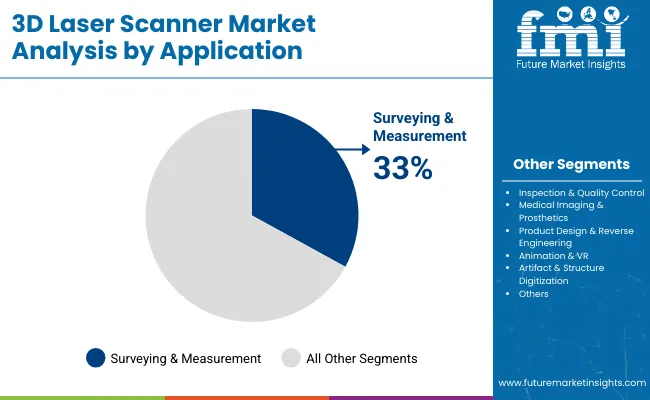
Surveying and measurement applications are estimated to hold 33% share of the 3D laser scanner market in 2025 and are projected to grow at a CAGR of 6.8% through 2035. Increased deployment has been driven by the demand for high-precision topographical data in infrastructure projects, including highways, tunnels, and rail networks.
These scanners enable accurate 3D mapping for site planning, digital twins, and structural analysis, reducing rework and enhancing safety compliance. Integration with GIS systems and compatibility with BIM platforms has strengthened adoption in urban planning and civil engineering. Government-led smart city projects across Asia-Pacific and regulatory mandates for digital construction models in Europe are further reinforcing application growth in this segment.
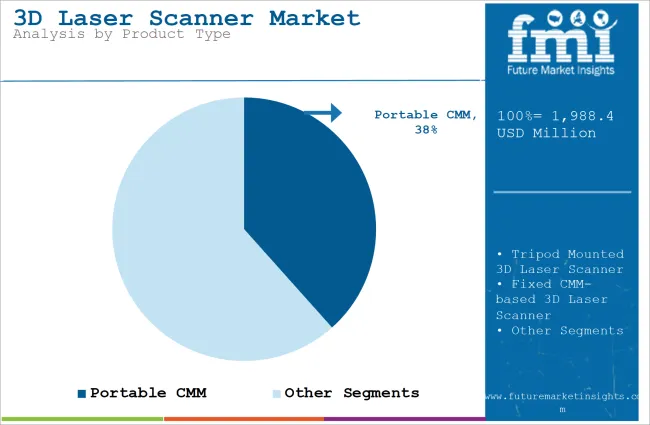
Handheld 3D laser scanners are projected to capture 37% of the global market share in 2025 and are forecast to register a CAGR of 6.9% through 2035. These devices have been adopted extensively due to their mobility, which facilitates scanning in confined spaces and dynamic environments.
The segment has gained traction in automotive reverse engineering, healthcare prosthetic design, and quality assurance operations, where portability and flexibility are critical. Recent technological enhancements such as wireless connectivity, lightweight design, and real-time point cloud visualization have improved usability for on-field engineers and inspection teams. Demand is further supported by cost efficiency compared to stationary systems, particularly in small-scale industrial and heritage digitization projects.
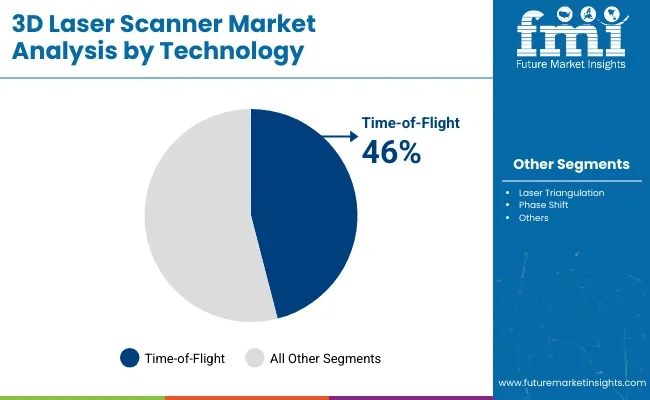
Time-of-Flight (ToF) technology is estimated to account for 46% share of the 3D laser scanner market in 2025 and is expected to grow at a CAGR of 6.7% through 2035. This dominance is driven by its ability to capture accurate measurements over long distances, making it ideal for surveying large infrastructure projects, mines, and utility networks.
ToF scanners are extensively used in geospatial mapping and energy sector applications due to their rapid scanning capability and operational efficiency in outdoor environments. Advancements in laser pulse precision and integration with LiDAR systems have further enhanced their adoption in autonomous navigation and aerial mapping. Investment in ToF-based mobile mapping solutions for smart transportation projects continues to boost its application footprint globally.
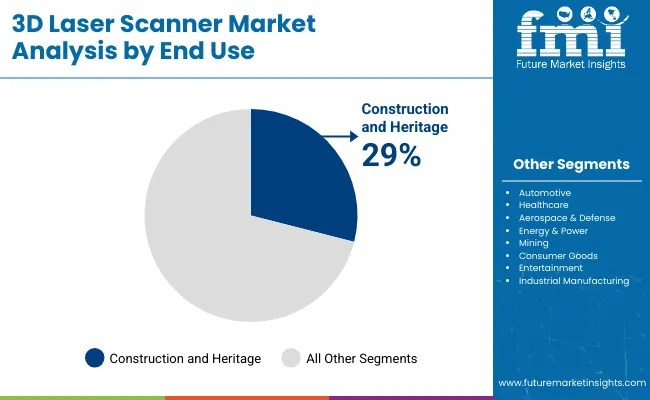
Construction and heritage preservation applications are projected to represent 29% of the 3D laser scanner market in 2025, advancing at a CAGR of 6.5% through 2035. These scanners have been deployed widely for as-built documentation, deformation monitoring, and restoration planning of historic structures. Adoption has been driven by the need for accurate digital models to reduce construction errors and preserve cultural assets.
Building Information Modeling (BIM) integration has enhanced the utility of scanners in structural audits and facility management. Governments across Europe and the Middle East have invested significantly in heritage conservation projects, accelerating technology uptake. Increasing emphasis on sustainable construction practices and regulatory compliance in safety inspections is expected to maintain growth momentum for this segment.
Rising Advances and Adoption of Innovative Technologies in the Construction Sector Will Increase Demand for 3D Scanners
Asia Pacific is one of the areas with a sizable proportion of the 3D laser scanner market. With its rising application in surveying at forthcoming onshore and offshore projects, pipelines and subsea models, etc., emerging economies in Asia Pacific are likely to exhibit prospective chances in the 3D laser scanners market.
The 3D Laser Scanner market is expanding at a rapid pace, thanks to rapid technological improvements. Artificial intelligence and machine learning advancements will boost 3D Laser Scanner applications and drive demand throughout the projected period.
Furthermore, a new generation 3D Laser Scanner with improved performance offers greater precision and versatility, with easy integration into systems, boosting expansion in the region's 3D Laser Scanner sector.
However, a paradigm shift toward a connected world, as well as a rising need for downsizing, are driving additional improvements in the 3D Laser Scanner market and the development of smarter goods. Because of the aforementioned factors, the Asia Pacific market for 3D laser scanners will rise at a 7.7% CAGR till 2035.
Extensive Applications in a Variety of End-Use Industries to Boost Market Growth
The flexibility of mobility included into the device is one of the most active reasons driving the growth of the 3D laser scanner industry. It is the most dependable technology for providing real-time visualization and a better degree of accuracy than other market options. The adoption of novel technologies in many businesses, regardless of industry, is projected to boost the 3D laser scanner market in the near future.
Countries such as the United States are expected to use 3D laser scanners to analyze crime scenes. Recent demos in Nevada employed 3D laser scanning capabilities to assist detectives in solving crimes involving weapon trajectories. Furthermore, these 0-R3 tiny artificially intelligent cars are likely to be seen on Dubai streets for patrolling and security purposes. The truck will be outfitted with a deployed drone 3D laser scanners slam technology to check for criminals, automobiles, and suspected explosives from a distance of 330 feet.
3D laser scanners are quickly becoming a crucial component in the building industry. A 3D laser scanner can collect topographical information at regions that people cannot access via the Internet of Things (IoT) using cutting-edge technology. During the forecast period, such desire to boost automated workflow adapted with reduced chance of human mistake is likely to drive the 3D laser scanners market.
Expanding Applications in Infrastructure Development and Smart Cities
Growth of infrastructure modernization and smart cities worldwide is significantly creating an opportunity for the market of 3D laser scanner. Governments everywhere are investing so heavily in improving transportation networks, utilities, and urban planning through upgrading projects. For instance, the design, development, and maintenance of these smart cities must be done efficiently on layouts, transport systems, and the energy grid and hence require such mappings.
3D laser scanners are providing spatial data of the utmost accuracy and detail to enable the development of digital twins of the urban environment. Authorities can, therefore, track infrastructure, upgrade plans, and predict real-time maintenance requirements. Furthermore, the development of smart buildings relies on 3D laser scanning to take measurements for accurate energy efficiency and structural integrity.
High Maintenance and Installation Costs are Impeding Market Growth
Despite various advantages, 3D laser scanners have some limitations in terms of applications, which limit market growth. For example, the high initial cost of high-resolution 3D scanners, together with the sector’s reliance on non-3D industries, is two important factors restraining the 3D scanning market.
The 3D laser scanner market is significantly impacted by high installation and maintenance costs, which in turn are a strong restraint to widespread adoption. In particular, sophisticated models of this scanner are often used in industries and infrastructure projects requiring significant initial expenditure for purchase and installation. This technology is quite complex, necessitating highly qualified personnel for appropriate installation and calibration, thereby also increasing costs.
The costs of maintenance add to the expense. Regular servicing, software updates, and replacing parts like lasers or sensors will ensure accuracy and efficiency. This cost is typically more for sectors requiring precision scanning, such as automotive, aerospace, and construction. For SMEs, the cost may be too high for them to be able to use it even though the potential benefits are promising.
Tier 1 companies include industry leaders with annual revenues exceeding USD 100 Million. These companies are currently capturing a significant share of 55% to 60% globally. These frontrunners are characterized by high production capacity and a wide product portfolio.
They are distinguished by extensive expertise in manufacturing and a broad geographical reach, underpinned by a robust consumer base. These firms provide a wide range of products and utilize the latest technology to meet regulatory standards. Prominent companies within Tier 1 include Basis Software, Inc., FARO, Hexagon AB, 3D Digital Corporation, ShapeGrabber Inc., JoeScan, Kreon Technologies and others.
Tier 2 includes most of the small-scale companies operating at the local level-serving niche 3D Laser Scanner vendors with low revenue. These companies are notably oriented toward fulfilling local demands. They are small-scale players and have limited geographical reach. Tier 2, within this context, is recognized as an unorganized segment, denoting a sector characterized by a lack of extensive structure and formalization when compared to organized competitors.
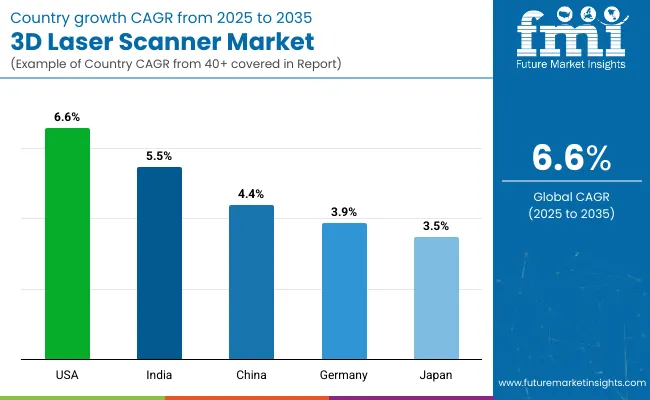
| Countries | CAGR, 2025 to 2035 |
|---|---|
| The USA | 6.6% |
| India | 5.5% |
| China | 4.4% |
| Germany | 3.9% |
| Japan | 3.5% |
The section below covers the analysis of the 3D Laser Scanner industry in different countries. Demand analysis of key countries in several regions of the globe, including North America, Asia Pacific, Europe, and others, is provided. The USA is anticipated to remain at the forefront in North America, with a value share of 72.7% in 2035. In South Asia, India is projected to witness a CAGR of 5.5% through 2035.
North America is the second-largest region accounting for 28% of the share in the global 3D laser scanner market during the forecast period. The USA is leading the region due to retaining its growth pace during the forecast period, according to the Future Market Insights report. The USA 3D laser scanner market size is rising due to the increased use of 3D laser scanners in cameras to investigate deadly traffic incidents.
Furthermore, the presence of well-known players, face recognition, and iris scanning is driving the market during the forecast period. Computing systems for 3D virtualization are becoming increasingly common as the cost of computers and graphics processors has fallen in recent years.
Moreover, rising 3D scanning enables quick, tailored part replacement increasing the 3D laser scanner market growth during the forecast period. Similarly, these scanners are widely employed in a variety of end-use sectors, including automotive and healthcare which is propelling the US 3D laser scanner market size.
Europe is the largest revenue region, accounting for approximately 30% of the share in the 3D laser scanner market. The UK is leading the market size due to the rising adoption of 3D laser scanner technology in the study of palaeontology. This technique is being used by researchers to explore the interplay between plants and extinct creatures in the UK 3D laser scanner market during the forecast period. Moreover, expanding automotive sector and supremacy in passenger vehicle manufacture, demand is expected to rise throughout the forecast period.
On the other hand, Germany is expected to acquire the lion's share, thanks to the industry's rapid development of 3D scanning technologies. The DAVID Structured Light Scanner (SLS-3) is a 3D scanner designed by DAVID, a German company. The scanner costs roughly USD 4,000 and is suitable for a wide range of applications, including reverse engineering, inspection, and archaeology. The rising use of reverse engineering procedures is propelling the Germany 3D laser scanner market. BMW, a German vehicle manufacturer, was an early adopter of 3D printing and 3D scanning technologies.
China is one of the major market players for 3D laser scanners due to its fast infrastructural development and increasing manufacturing sector. Large-scale investments in smart cities and transportation-related projects boost scanner demand in the construction mapping and surveying space.
An interesting aspect is that the automotive and electronics industries of China demand prototyping and quality assurance through 3D scanners. Another growth factor for this field is the push for digital transformation in manufacturing and industrial automation by the government. Implementing policies in its favour boosts growth further. For SMEs, low prices of locally manufactured scanners act as a driving force.
Positioned as the 'world's workshop', China can maintain demand for high-tech scanning technologies with its continued manufacturing hub status.
Companies are advancing their position in the market by developing products with multi-mode scanning capabilities, enhancing versatility for applications such as reverse engineering, industrial inspection, and design. Investment is being made in advanced metrology solutions that improve scanning speed, accuracy, and data processing, particularly in complex sectors like aerospace, automotive, and heavy machinery. These efforts ensure companies can meet the growing demand for high-performance scanning tools.
On the basis of application the market is segmented into Surveying & Measurement, Inspection & Quality Control, Medical Imaging & Prosthetics, Product Design & Reverse Engineering, Animation & VR, Artifact & Structure Digitization, and Others
On the basis of end use the market is segmented into Automotive, Healthcare, Aerospace & Defense, Energy & Power, Mining, Construction & Heritage Preservation, Consumer Goods, Entertainment, and Industrial Manufacturing
On the basis of product type the market is segmented into Handheld, Stationary (Tripod Mounted, Fixed), and Airborne
On the basis of technology the market is segmented into Laser Triangulation, Time-of-Flight, and Phase Shift
On the basis of region the market is segmented into North America, Latin America, Eastern Europe, Western Europe, South Asia & Pacific, East Asia, Middle East & Africa
The industry was valued at USD 1,844.5 Million in 2024
The industry is set to reach USD 1,988.4 Million in 2025
The industry value is anticipated to rise at 6.6% CAGR through 2035
The industry is anticipated to reach USD 4,214 Million by 2035
Germany accounts for 17.2% of the global 3D Laser Scanner market revenue share alone.
India is predicted to witness the highest CAGR of 5.5% in the 3D Laser Scanner market.






Our Research Products

The "Full Research Suite" delivers actionable market intel, deep dives on markets or technologies, so clients act faster, cut risk, and unlock growth.

The Leaderboard benchmarks and ranks top vendors, classifying them as Established Leaders, Leading Challengers, or Disruptors & Challengers.

Locates where complements amplify value and substitutes erode it, forecasting net impact by horizon

We deliver granular, decision-grade intel: market sizing, 5-year forecasts, pricing, adoption, usage, revenue, and operational KPIs—plus competitor tracking, regulation, and value chains—across 60 countries broadly.

Spot the shifts before they hit your P&L. We track inflection points, adoption curves, pricing moves, and ecosystem plays to show where demand is heading, why it is changing, and what to do next across high-growth markets and disruptive tech

Real-time reads of user behavior. We track shifting priorities, perceptions of today’s and next-gen services, and provider experience, then pace how fast tech moves from trial to adoption, blending buyer, consumer, and channel inputs with social signals (#WhySwitch, #UX).

Partner with our analyst team to build a custom report designed around your business priorities. From analysing market trends to assessing competitors or crafting bespoke datasets, we tailor insights to your needs.
Supplier Intelligence
Discovery & Profiling
Capacity & Footprint
Performance & Risk
Compliance & Governance
Commercial Readiness
Who Supplies Whom
Scorecards & Shortlists
Playbooks & Docs
Category Intelligence
Definition & Scope
Demand & Use Cases
Cost Drivers
Market Structure
Supply Chain Map
Trade & Policy
Operating Norms
Deliverables
Buyer Intelligence
Account Basics
Spend & Scope
Procurement Model
Vendor Requirements
Terms & Policies
Entry Strategy
Pain Points & Triggers
Outputs
Pricing Analysis
Benchmarks
Trends
Should-Cost
Indexation
Landed Cost
Commercial Terms
Deliverables
Brand Analysis
Positioning & Value Prop
Share & Presence
Customer Evidence
Go-to-Market
Digital & Reputation
Compliance & Trust
KPIs & Gaps
Outputs
Full Research Suite comprises of:
Market outlook & trends analysis
Interviews & case studies
Strategic recommendations
Vendor profiles & capabilities analysis
5-year forecasts
8 regions and 60+ country-level data splits
Market segment data splits
12 months of continuous data updates
DELIVERED AS:
PDF EXCEL ONLINE
3D Imaging Surgical Solution Market Size and Share Forecast Outlook 2025 to 2035
3D Printing Industry Analysis in Middle East Size and Share Forecast Outlook 2025 to 2035
3D Printed Dental Brace Market Size and Share Forecast Outlook 2025 to 2035
3D Reverse Engineering Software Market Forecast and Outlook 2025 to 2035
3D Automatic Optical Inspection Machine Market Size and Share Forecast Outlook 2025 to 2035
3D Ready Organoid Expansion Service Market Size and Share Forecast Outlook 2025 to 2035
3D-Printed Prosthetic Implants Market Size and Share Forecast Outlook 2025 to 2035
3D Printing Ceramics Market Size and Share Forecast Outlook 2025 to 2035
3D NAND Flash Memory Market Size and Share Forecast Outlook 2025 to 2035
3D Printing Metal Market Size and Share Forecast Outlook 2025 to 2035
3D Bioprinted Organ Transplants Market Size and Share Forecast Outlook 2025 to 2035
3D Mapping and Modeling Market Size and Share Forecast Outlook 2025 to 2035
3D Audio Market Size and Share Forecast Outlook 2025 to 2035
3D Printing in Aerospace and Defense Market Analysis - Size, Share, and Forecast Outlook 2025 to 2035
3D Printed Maxillofacial Implants Market Size and Share Forecast Outlook 2025 to 2035
3D Surgical Microscope Systems Market Size and Share Forecast Outlook 2025 to 2035
3D-Printed Personalized Masks Market Size and Share Forecast Outlook 2025 to 2035
3D Printing Market Size and Share Forecast Outlook 2025 to 2035
3D Printed Packaging Market Size and Share Forecast Outlook 2025 to 2035
3D Printed Clear Dental Aligners Market Size and Share Forecast Outlook 2025 to 2035

Thank you!
You will receive an email from our Business Development Manager. Please be sure to check your SPAM/JUNK folder too.
Chat With
MaRIA